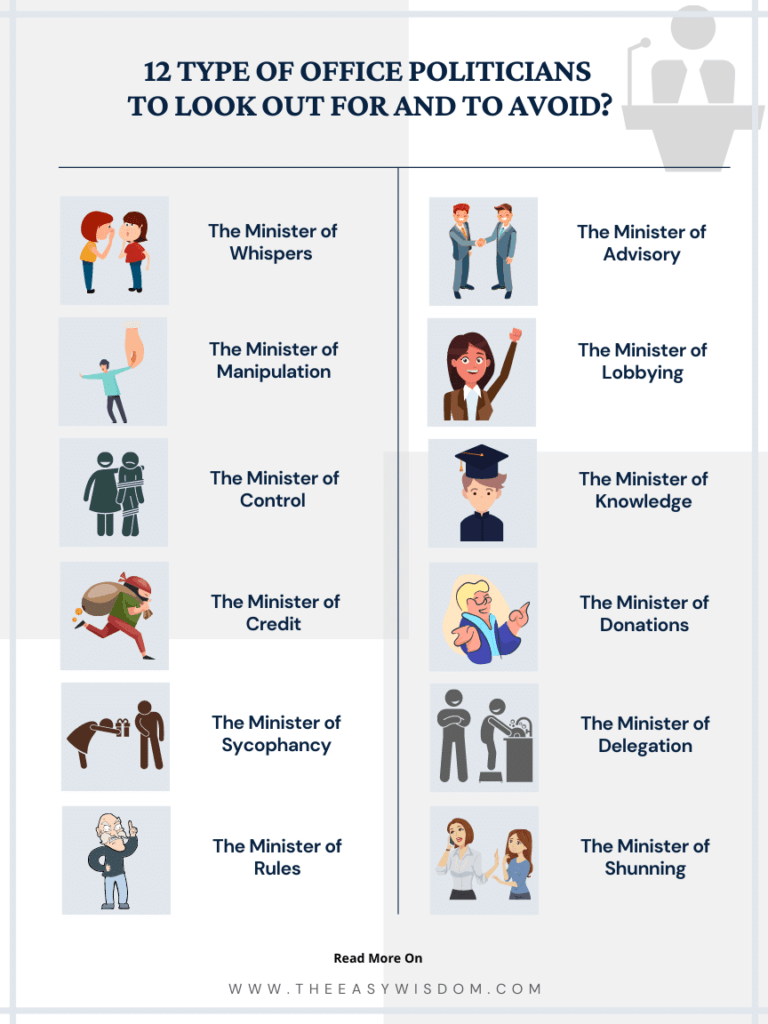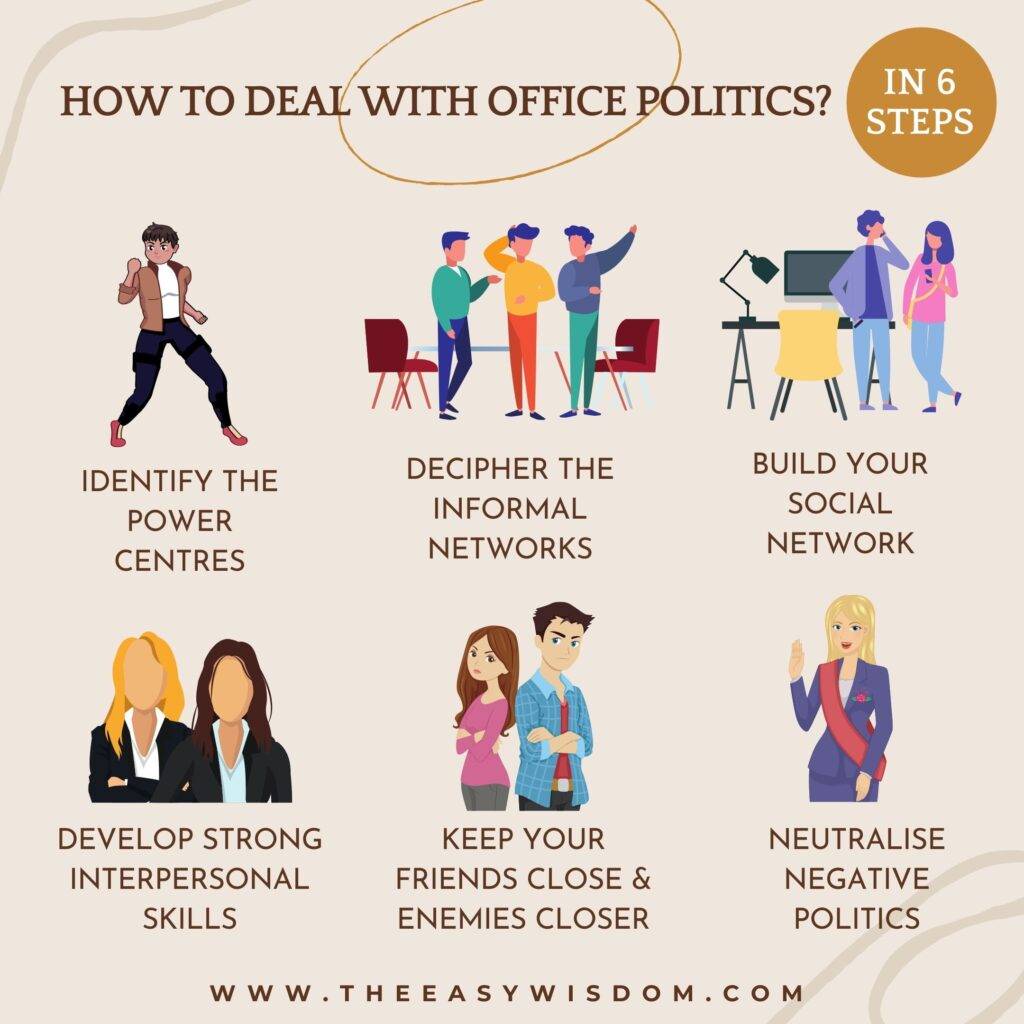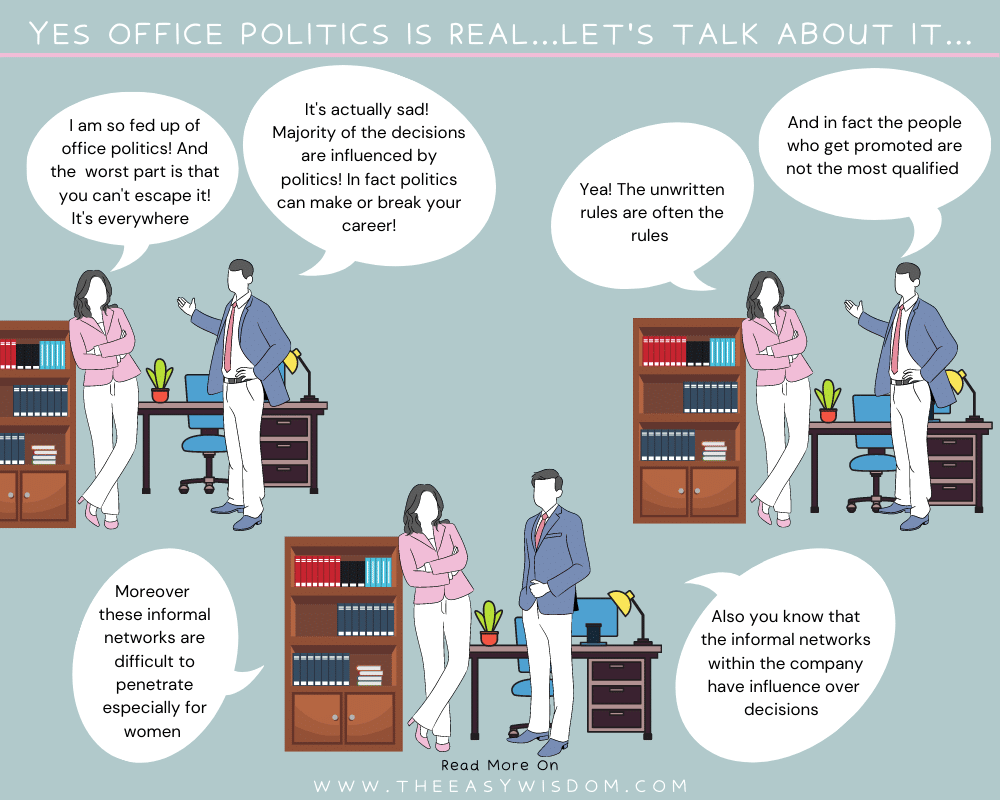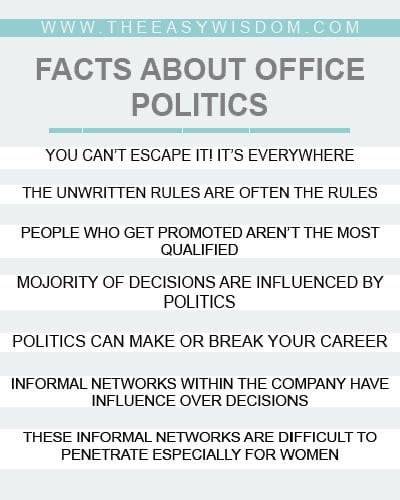In This Article
What comes to mind when you think of office politics or workplace politics? Is it backstabbing, sycophancy, powerplays, blame games, gossip, or sucking up to your manager to get the job promotion and whatnot?
Do you ever feel that everyone in your office is acting like they are in the real-life version of the series game of thrones? Do you think your office is plagued with catfights, power struggles, cut-throat competition, and flattery to gain an edge over others and climb the corporate ladder?
But this is not it!
You have seen how your coworkers suck up to your manager and get the highest salary hikes and promotions despite being the least deserving ones. And you still remember how your associate got the most coveted client portfolio and a foreign assignment that was long due to you. Right?
It’s obvious to feel cheated, humiliated, and under-rewarded! It is demotivating, can detach you from work, and even make you quit your job.
Indeed, it would have done the same to you.
If this is the case, you must stay away from office politics or workplace politics as much as possible.
But like it or despise it, office politics are part of your daily work life.
Welcome to reality!
It is what office politics is all about- the misuse of power and position to reward employees based on factors other than merit, sincerity, and performance!
So, have you been a victim of workplace politics?
I bet you have been! Office politics is a real deal.
If you are dealing with power tussles and politics in the workplace and want to get out of it, you need to neutralize office politics by working your way through it diplomatically!
You can’t eradicate or avoid office politics, for sure. But you can offset it tactfully.
So how can you go about it, and how to deal with office politics?
To do so, you must first identify the power centres and the workplace politicians to avoid and work with. And then, you can take a few steps to neutralize office politics and deal with it for a successful corporate career.
What is office politics?
Office politics or workplace politics refers to an unhealthy environment within a company where the employees compete against each other to improve their power and position by indulging in unfair or unethical practices such as sycophancy, backstabbing, gossiping, powerplays, etc.
When office employees exploit informal and unofficial networks to advance their personal propaganda, mostly at the expense of other coworkers, such as seeking a promotion, getting a salary hike, securing comfortable job postings, or grabbing those coveted assignments or clients by bypassing others, even when they don’t deserve it, it is called office politics.
While gossiping and rumours are the most common type of office politics, sycophancy, backstabbing, credit snatching, blame gaming, flattering, and sabotaging are also part of workplace politics that employees commonly experience at their workplace.
Office politics practically exist in all organizations, private companies, or the government.
What is the reason for the existence of office politics?
So why do office politics exist in the first place?
A workplace is made up of people who come from different walks of life, different cultures, backgrounds, and capabilities. Almost all workplaces are political as people bring to office their ambitions, emotions, insecurities, and expectations that manifest in their professional lives. It all results in a difference of opinion and conflict of interests. And as a result, office politics is born.
Office politics is damaging and sets the wrong precedence as employees and staffers misuse their power to gain promotions and other advantages at the workplace in a never-ending attempt to be successful.
Positive office politics
Although office politics has a negative connotation, it can sometimes be used positively to benefit the employees across the organization. It is called positive office politics. When employees use office politics positively, they can make meaningful connections and form informal pressure groups to influence the management to bring about positive change in the company that can benefit everyone at large. Workplace politics can also be positively used for networking and reinforcing stakeholder relations.

Why is office politics harmful to employees and organizations?
When employees perceive their workplace as political, they believe that merit is no longer a perk, and the workplace is no more trustworthy for their survival, growth, and professional fulfilment. As a result, it is natural for the staffers to be detached, less engaged in their work, and less caring towards contributing to the cause of team goals or company vision.
Workplace politics, therefore, hurts employee morale, reduces productivity, and impacts company culture, which has company-wide repercussions.
Office politics is troublesome for business owners and top management alike, who continually fight to scale up their businesses that cannot function at optimal levels due to workplace politics. Office politics tars the organization’s image and deflects potential talent from joining the company workforce, leading to a talent crunch. Not only attracting the right talent but also talent retention and high attrition becomes challenging for companies that are political in their functioning.
Therefore, office politics can impede the growth of companies and can be a roadblock to organizational success.
So, to survive one’s professional career, one should know how to deal with office politics effectively by understanding its adverse effects.
Facts about office politics
Here are a few facts about office politics or workplace politics that you should know
- You can’t escape workplace politics, as it is everywhere.
- Some unwritten rules are often the RULES!
- People who get promoted or get maximum salary hikes are not always the most qualified for it. They just made it through it via power and influence.
- Politics influence a majority of the decisions at your workplace.
- Politics at the office can make or break your career.
- Informal networks within the companies influence the majority of decisions.
- These informal networks are difficult to penetrate, especially for women.
12 Type of office politicians to look out for and avoid?
So you want to know how to deal with office politics? To navigate the political landscape of your office successfully, you should identify twelve types of office politicians you come across daily and handle them properly. (Refer to types of office politics infographic)
Also Read: 6 Types of Toxic People to Avoid in Your Life- Spot, Stop, and Cut-off

1. The Minister of Whispers
The master of whispers knows it all when it comes to office gossip. They can often be found spilling official and personal secrets while sipping coffee in the cafeteria. They are aware of everything happening around the office and know it before anyone else even has an idea.
What to do?
While dealing with these tittle tattlers, keeping your conversation limited to business is crucial while not revealing your personal life. If the conversation leads to a discussion related to personal lives, it is advisable to exit such dialogue ASAP.
2. The Minister of Manipulation
As the name suggests, the manipulators manipulate the information as it comes and twists it to their advantage. They collect information and gossip about it by manipulating the same for their vested interest. They are difficult to spot but not impossible.
What to do?
Do not share much of your information with such people. Steer clear with them and deal with them only professionally.
3. The Minister of Control
We all know of these controllers and bullies in our workplace who love to control and boss around. Such people are not difficult to recognize. Controllers or bullies control how you do your job, socialize and deliver. Instead of advising or teaching you something, they may even do your task themselves and get your job done in their own way. They may even overshadow you to have a sense of control. And they often have big fake egos.
You are merely a tool or a puppet in their hands, whom they love to manoeuvre and control to satisfy their self-esteem and massage their inflated egos. You are good to go as long as you are under their claws, but as soon as you rebel, the deal is over. Watch out for such bullies, especially if such a person is your manager.
What to do?
Be proactive and learn to say ‘no.’ Learn to do your work your way, and have confidence in yourself. Give a clear message to such workplace politicians that you do not want them to do your job; instead, you preferer doing your work yourself and your way.
4. The Minister of Credit
Credit usurpers are experts in taking credit for someone else’s ideas in an attempt to climb the corporate ladder too fast. It won’t be wrong to call them climbers. They won’t be hesitant to take credit for even the most minor things like arranging meetings, meeting deadlines, new ideas, team achievement, and even company success. Be aware of them as they can be really harmful!
What to do?
Do not be a target of credit thieves and speak up whenever required, even if it means keeping your manager and team member informed about the task you are busy working on. Keep your managers updated with frequent emails or chats regarding the progress of your work and the part you are handling so that they are clear about who is getting the credit for work.
5. The Minister of Sycophancy
You may be well aware of people who suck up to their bosses, flatter them, and even go the extra way to become personal assistants to bosses’ families. They can be well-classified as suckers-ups or flatterers.
They may not sabotage you, but they know how to get away with murder owing to their unique skill of flattery. The tricky part is that some bosses may even enjoy their flattery. So how to deal with them?
What to do?
Most seasoned managers know if someone is sucking up or making genuine efforts. They may not even affect you. Keep up your good work, and let the results speak for themselves. The best part is your bosses will prioritize the work output and merit rather than flattery.
6. The Minister of Advisory
All the companies have a couple have persons who occupy the position of trust. The management confides in the services rendered by such advisors and turns to them for advice. The advisors may yield a lot of influence as they are often the eye and ears of the management.
What to do?
Be aware of them and work towards developing a good rapport with them. Staying in their good books will always benefit you, at least in the long turn.
7. The Minister of Lobbying
The lobbyists are the ones who are closely associated with the power centres and groups which significantly influence your workplace. They lobby well with such pressure groups, sway opinions in their favour, and get their interests executed. They may be well termed as power aligners as they tend to seek power by aligning themselves with power.
What to do?
Align with such people in good spirits and network well. Explain your viewpoint, even if it differs from theirs, and make them believe in what you think is true.
8. The Minister of Knowledge
Such politicians are not necessarily annoying and dangerous. Knowledge and skill is the key driving force behind any business. Such people know everything and are masters of what they do. They even may know everyone in the organization. They believe knowledge is power and often come across as arrogant, rude, and even grumpy. They do not want gossip or manipulation but, at the same time, may not reveal all that they know and may now open up with everyone.
The key to the question of how to deal with office politics lies here. Knowledge is paramount; therefore, it is essential to seek knowledge. Align yourself with the Minister of Knowledge and reap the benefits.
What to do?
Getting on their right side is the most beneficial thing you can do for yourself. If you hit the right note, they will support you and advise you on career and workplace issues.
9. The Minister of Donations
Such people are pretty easy to spot. These are really good at seeking help and advice from others without giving anything back to them. They will take but will never reciprocate. You may be helping them from time to time, but when it comes time to seek help from them, they are shut for business. They are like a donation box; you donate and forget. It can get very annoying, and you may feel completely used.
What to do?
Stop helping them first, and be clear about your expectations if you choose to help them. If such people are not dispensable, communicate to them clearly about your help and that you will need a return favour when the time comes. They may eventually help you as they may realize that they owe you.
10. The Minister of Delegation
“Can you please do this thing for me? Thank you!” This statement will ring a bell in your mind to remind you of your previous experience with such people. These people exist in workplaces and assume delegation yields their power. They believe the person who assigns the work is the boss, and those executing the tasks are the subordinates. These delegation masters or taskers position themselves as influential individuals. In some cases, even your boss can be a tasker and may directly delegate work to assert his authority.
What to do?
The delegation masters often pick people they think are easy to boss around. In such cases coming across as a strong individual with clearly defined roles and responsibilities can come handy. Saying no politely will surely give them a clear message that you cannot be bossed around.
11. The Minister of Rules
“Please stick to the rules and guidelines” is the statement often used by individuals who make their claims to power under the garb of SOPs, rules, and regulations. Such individuals tend to look confident and powerful. But sometimes, such individuals themselves alter or bypass the rules in their own interest. On paper, they may follow all the rules, but the scene is sometimes quite the opposite. Such individuals are rarely solid and always hide behind the rules.
What to do?
Sticking to the official rules and regulations is always a good idea. But If you spot such people who bend the rules or processes for their own benefit but preach the rules and regulations, report them to your manager or HR department immediately.
12. The Minister of Shunning
“Oh! We didn’t see you standing there!” And you know they were exactly speaking about you; in this case, it wasn’t something encouraging. Such politicians make sure to socially exclude you from their group as you don’t align with their political ideology, for example. These people often create in-groups and may ignore you. They even gaslight you when you confront them and deny such a thing by saying it’s in your own head. Shunning is a kind of social punishment they give you because they perceive you as superior or vice versa. They gang up against you as they consider you a threat.
“The new colleague may be beautiful and charming, but she is not one of us.”
What to do?
The shunning game is the hardest to break. Confronting such people will make you come across as insecure and childish. Try to avoid such people in the first place. If you are too keen to break this, you can covertly work with one of the members of such a group who is least aligned to the cause of politics of this group, befriend this person and end the power game.
How to deal with office politics and neutralize it?

The key to effectively dealing with office politics is to accept it first and neutralize it by engaging in positive office politics while ignoring its negative counterpart.
People may come and go, but office politics is always a permanent feature of any organization. So be ready to face it!
1. Identify the power centres
Analyze the organizational chart and look for the influencers possessing the real power. Map the power centres rather than be blinded by swanky designations. Find out the brain behind the business and how they impact the office dynamics.
2. Decipher the informal networks
Once you know where the power and influence lie, you may closely examine how the interactions occur within your organization by understanding the informal and social relationship flows. Find out discreetly who gets along with who and vice versa. Look out for in-groups and out-groups, and uncover the main reasons the connections are formed, such as friendship, respect, interests, or anything else.
3. Build your social network
You can now start building your own network with a complete understanding of workplace dynamics. It would be best to look beyond your direct line of reporting by cutting across other teams and hierarchies. There is nothing wrong with connecting with powerful people in the company with whom real influence lies. Build quality connections with such people while not aligning yourself with one particular group or power centre.
4. Develop strong interpersonal skills
Focus on your interpersonal skills, and work upon your emotional intelligence. Manage others’ emotions well and think before you act. Politics is all about people and the emotions they bring to the office. So working on your interpersonal skills will tide you past all political troubles. Take a neutral stand, and practice diplomacy and tact.
Also Read: 5 Tips for Positive Relationships At Work
5. Keep your friends close and enemies closer
Keep the manipulators and gossip mongers closer while maintaining a delicate distance. Be courteous to them and understand their behaviour and goals so that you are prepared to counter the effects of their negative politics. Just make sure to guard yourself against such people while maintaining a cordial relationship with them.
Also Read: 5 Tips for Choosing your Friends wisely
6. Neutralise negative politics & think win-win
Do not fuel the fire. Instead, work towards spreading positivity at the workplace by remaining professional, not taking sides, acting as a barrier to rumours, and resolving conflicts amicably and constructively. If you choose to voice a concern or be a whistleblower, be confident and assertive but not aggressive and confide in top management, who can offer you protection. In the end, keep the organizational objective in mind rather than satisfying your selfish motive and create a win-win situation for all.
Please share your journey with us if you have ever dealt with office politics and successfully overcame the same. We will love to hear your thoughts on how to deal with office politics so that many of us can learn to deal with workplace politics for professional success and growth!
PS: If you like this article, please share it with your friends and family. Also, check out our YouTube Studio for some inspiring and life-changing videos!









I have been assigned to a new project with one other team member. He is excellent at playing political games and one of those that is all talk and no skills or background to back it up. BUT he is VERY good about talking over me and sounding like he is an authority. I have more experience and knowledge and it shows because I am doing 90% of the training assignments, which doesn’t show because they are assigned to both of us and no one has time to decipher who does what. My coworker has no problem acting as if he did part of the work. Another one of the main problems is that after our training sessions, I jump in and get right to it because I understand what was being asked. He acts as if he understands while in the training session, but the expects me to explain everything once he decides to start working. Sometimes I will be working for several days, figuring out all the problems, asking questions and getting it done. Once he finally starts working (after I’ve filtered through all the problems) he expects me to catch him up on everything and explain how it all works. Help!!! How do I deal with this sneaky, manipulative player?
Hey Darla,
It seems that your teammate is quite clever at taking the credit. I think you should act smart and take all the credit for your work yourself. Mark all the work you do in an email chain to your manager and make it your daily habit. It will help your manager see your work and he will understand that the other person is just trying to snatch the credit from you.
Also, after the training sessions, there is no need for you to help and explain it all to your teammate. There is no need for spoon-feeding your teammate. It is not your KRA.
Having said that, you have to be very smart about all this and do it in a subtle manner.
Hope this works for you!